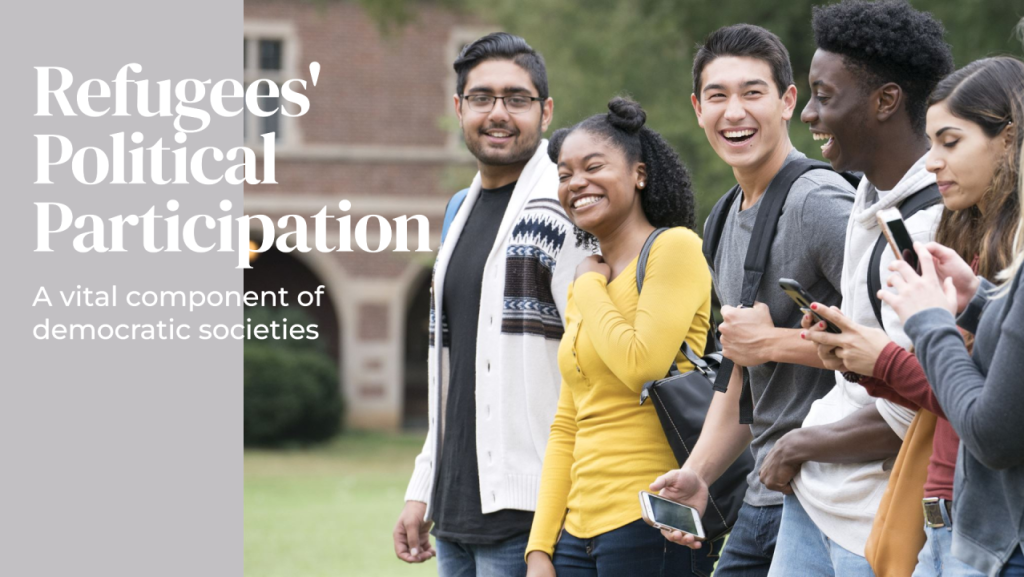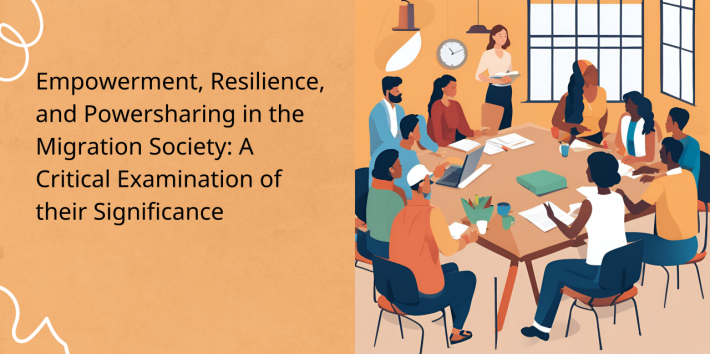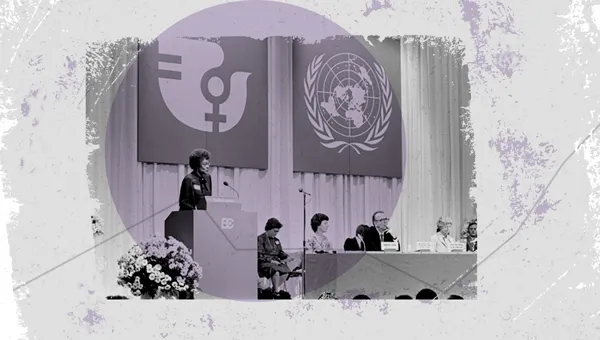Political Participation of Refugees: A Vital Component of Democratic Societies

Introduction
The global refugee crisis has reached unprecedented levels, with millions of individuals forced to flee their homes due to conflict, persecution, and environmental disasters. As these displaced populations seek refuge in foreign lands, they face a myriad of challenges, including access to basic necessities, safety, and integration into host communities. Amidst these struggles, the question of political participation emerges as a pivotal yet often overlooked aspect of the refugee experience.
At its core, political participation encompasses the engagement of individuals in the decision-making processes that shape their lives and communities. This involvement can take various forms, including voting in elections, participating in advocacy campaigns, joining community organizations, or running for public office. For refugees, political participation represents not only a means of asserting their rights and interests but also a pathway to integration, empowerment, and belonging in their new societies.
To understand the significance of political participation for refugees, it is essential to grasp the unique challenges they face upon displacement. Forced to abandon their homes and livelihoods, refugees embark on perilous journeys in search of safety and security. The trauma of displacement, coupled with the uncertainty of asylum, can leave refugees feeling vulnerable and powerless. In many cases, their legal status may be precarious, with limited access to employment, education, and healthcare.
In the face of these challenges, political participation offers refugees a sense of agency and voice in shaping their destinies. By participating in the democratic processes of their host countries, refugees can advocate for policies that address their specific needs and concerns. Whether it be advocating for better access to education and healthcare, fighting discrimination and xenophobia, or promoting peace and reconciliation in their countries of origin, political participation enables refugees to have a say in the decisions that affect their lives.
Moreover, political engagement serves as a catalyst for integration and social cohesion within host communities. By actively participating in civic life, refugees demonstrate their commitment to their new homes and contribute to the diversity and richness of their societies. Through dialogue, collaboration, and mutual respect, refugees and host communities can forge bonds of solidarity and understanding, transcending cultural and linguistic barriers.
However, despite its importance, political participation for refugees is not without its challenges and barriers. Legal restrictions, language barriers, social stigma, and economic hardships can hinder refugees’ ability to engage meaningfully in political processes. Discriminatory policies and practices may disenfranchise refugees, depriving them of their rights and perpetuating their marginalization.
Nevertheless, efforts to overcome these barriers and promote the political participation of refugees are underway. Governments, civil society organizations, and international agencies are working to enact policies that uphold refugees’ rights and facilitate their integration into host societies. Language and civic education programs are being implemented to empower refugees with the knowledge and skills necessary to engage in political processes. Community-based initiatives are providing support and resources to refugees, enabling them to organize, advocate, and mobilize for change.
The political participation of refugees is not only important but essential for the realization of democracy, human rights, and social justice. By empowering refugees to engage in the political processes of their host countries, we not only uphold their dignity and agency but also strengthen the foundations of inclusive and pluralistic societies. As we confront the challenges of forced displacement and seek to build a more just and equitable world, let us recognize the transformative power of political participation in the lives of refugees and commit to ensuring that their voices are heard and their rights respected.
Understanding the Refugee Experience
To grasp the significance of political participation for refugees, it’s imperative to delve into the multifaceted nature of the refugee experience. Refugees are individuals who have been forcibly displaced from their homes due to persecution, conflict, violence, or natural disasters. Their journey from their countries of origin to seeking asylum in foreign lands is often marked by trauma, uncertainty, and profound loss.
The decision to flee one’s homeland is never taken lightly. For refugees, it represents a last resort in the face of grave danger or persecution. Many are forced to leave behind everything they know and love – their homes, communities, and belongings – in search of safety and security. The journey itself is fraught with peril, as refugees navigate treacherous routes, evading conflict zones, human traffickers, and other dangers along the way.
Upon reaching the borders of their intended destinations, refugees are confronted with a complex web of legal, bureaucratic, and logistical challenges. They must navigate asylum procedures, often in unfamiliar languages and legal systems, while grappling with the trauma of their past experiences. In many cases, refugees are detained, subjected to lengthy asylum processes, or denied entry altogether, exacerbating their sense of vulnerability and insecurity.
For those fortunate enough to be granted asylum, the challenges are far from over. Refugees face numerous obstacles to integration into their host societies, including language barriers, cultural differences, and discrimination. They must rebuild their lives from scratch, often with limited resources and support, while contending with the psychological scars of their past traumas.
Moreover, refugees often find themselves caught in a state of limbo, unable to return to their countries of origin due to ongoing conflict or persecution, yet denied the full rights and privileges of citizenship in their host countries. This liminal status leaves refugees in a precarious position, vulnerable to exploitation, abuse, and marginalization.
Amidst these challenges, the notion of political participation may seem like a distant or even irrelevant concern for refugees. However, a closer examination reveals its profound significance in shaping their experiences and aspirations. Political participation is not simply a matter of casting ballots or holding office; it is a means of asserting agency, reclaiming dignity, and shaping the course of one’s own destiny.
For refugees, political participation offers a means of reclaiming their voice and agency in the face of disempowerment and marginalization. By engaging in the political processes of their host countries, refugees can advocate for their rights, needs, and interests, challenging the narratives of victimhood and dependency that often surround them. Whether it be through grassroots activism, community organizing, or advocacy campaigns, political participation enables refugees to assert their presence and assert their rights as equal members of society.
Moreover, political engagement serves as a catalyst for empowerment and integration within host communities. By participating in civic life, refugees demonstrate their commitment to their new homes and contribute to the diversity and richness of their societies. Through dialogue, collaboration, and mutual respect, refugees and host communities can forge bonds of solidarity and understanding, transcending cultural and linguistic barriers.
However, the path to political participation is fraught with obstacles and challenges for refugees. Legal restrictions, language barriers, social stigma, and economic hardships can hinder their ability to engage meaningfully in political processes. Discriminatory policies and practices may disenfranchise refugees, depriving them of their rights and perpetuating their marginalization.
Nevertheless, efforts to overcome these barriers and promote the political participation of refugees are underway. Governments, civil society organizations, and international agencies are working to enact policies that uphold refugees’ rights and facilitate their integration into host societies. Language and civic education programs are being implemented to empower refugees with the knowledge and skills necessary to engage in political processes. Community-based initiatives are providing support and resources to refugees, enabling them to organize, advocate, and mobilize for change.
Understanding the refugee experience is essential for recognizing the importance of political participation in shaping their lives and aspirations. Refugees are not passive victims but resilient individuals with agency and voice. By empowering refugees to engage in the political processes of their host countries, we not only uphold their dignity and rights but also strengthen the foundations of inclusive and pluralistic societies. As we confront the challenges of forced displacement and seek to build a more just and equitable world, let us recognize the transformative power of political participation in the lives of refugees and commit to ensuring that their voices are heard and their rights respected.
The Importance of Political Participation
Political participation is a cornerstone of democratic governance, embodying the principle of citizen engagement in decision-making processes that affect their lives. For refugees, political participation holds profound significance, offering a means of empowerment, representation, and integration within their host communities. By actively engaging in political activities, refugees assert their presence, advocate for their rights, and contribute to the democratic fabric of their new societies.
1. Representation and Voice:
Political participation grants refugees a platform to voice their concerns, needs, and aspirations. Inclusive political processes ensure that their voices are heard, enabling them to advocate for policies that address their unique challenges. Without representation, refugees risk being marginalized and excluded from decision-making processes that directly impact their lives. By participating in elections, joining advocacy groups, or running for office, refugees assert their presence and demand recognition as equal members of society.
2. Integration and Empowerment:
Engaging in political activities fosters a sense of belonging and integration within the host society. By participating in civic life, refugees demonstrate their commitment to their new homes and contribute to the diversity and richness of their communities. Political participation empowers refugees with the knowledge, skills, and confidence necessary to navigate the complexities of their new environments. It provides a sense of agency and control over their destinies, countering feelings of helplessness and dependency often associated with displacement.
3. Policy Impact:
The perspectives and experiences of refugees offer valuable insights into crafting more inclusive and effective policies. Their firsthand knowledge of displacement, resilience, and adaptation can inform policymaking processes, leading to more nuanced and compassionate approaches to refugee issues. By participating in democratic governance, refugees become stakeholders in shaping the policies that affect them directly. Whether advocating for improved access to education, healthcare, or employment opportunities, political participation enables refugees to influence decision-making and drive positive change in their communities.
4. Human Rights:
Political participation is inherently linked to the fulfillment of human rights. The right to participate in the political process is enshrined in international instruments such as the Universal Declaration of Human Rights and the International Covenant on Civil and Political Rights. Denying refugees this right not only violates their fundamental human rights but also undermines the principles of democracy and equality. By upholding refugees’ political rights, governments demonstrate their commitment to upholding human rights and promoting democratic values.
5. Community Engagement:
Political participation encourages refugees to engage with their communities and build meaningful connections with fellow residents. By participating in community events, volunteering, and collaborating on local initiatives, refugees contribute to the social fabric of their neighborhoods and foster a sense of solidarity and cohesion. These interactions break down barriers and stereotypes, fostering mutual understanding and respect among diverse populations.
Despite its importance, political participation for refugees is not without its challenges. Legal restrictions, language barriers, social stigma, and economic hardships can hinder refugees’ ability to engage meaningfully in political processes. Discriminatory policies and practices may disenfranchise refugees, depriving them of their rights and perpetuating their marginalization.
However, efforts to overcome these barriers and promote the political participation of refugees are underway. Governments, civil society organizations, and international agencies are working to enact policies that uphold refugees’ rights and facilitate their integration into host societies. Language and civic education programs are being implemented to empower refugees with the knowledge and skills necessary to engage in political processes. Community-based initiatives are providing support and resources to refugees, enabling them to organize, advocate, and mobilize for change.
The importance of political participation for refugees cannot be overstated. It is not only a matter of rights but a cornerstone of democratic governance and social cohesion. By empowering refugees to participate in political processes, we uphold their dignity, promote their integration, and strengthen the foundations of inclusive and pluralistic societies. As we navigate the complexities of displacement and seek to build a more just and equitable world, let us recognize the transformative power of political participation in the lives of refugees and commit to ensuring that their voices are heard and their rights respected.
Challenges and Barriers
Despite the importance of political participation for refugees, numerous challenges and barriers hinder their ability to engage meaningfully in political processes. These obstacles, ranging from legal restrictions to socioeconomic disparities, pose significant impediments to refugees’ ability to assert their rights, advocate for their needs, and contribute to democratic governance. Understanding and addressing these challenges is essential for fostering inclusive societies that uphold the principles of equality, diversity, and human rights.
1. Legal Restrictions:
Many countries impose legal barriers that limit refugees’ ability to engage in political activities. Restrictions on residency, citizenship, and voting rights disenfranchise refugees, perpetuating their marginalization and exclusion. In some cases, refugees may be denied the right to vote or run for office, depriving them of a fundamental aspect of democratic citizenship. Legal reforms are needed to ensure that refugees have equal access to political rights and opportunities for participation.
2. Language and Cultural Barriers:
Limited proficiency in the host country’s language and unfamiliarity with its political system pose significant challenges for refugees seeking to participate politically. Language barriers make it difficult for refugees to understand political processes, access information, and communicate their needs effectively. Cultural differences may also inhibit refugees from engaging in political activities, as they may feel unfamiliar or unwelcome in their new political environments. Providing language and cultural education programs can help overcome these barriers and empower refugees to participate more fully in civic life.
3. Social Stigma and Discrimination:
Refugees often face stigma and discrimination, which deter them from engaging in political processes. Fear of reprisal or backlash may inhibit refugees from expressing their opinions or asserting their rights. Discriminatory attitudes and practices may also prevent refugees from accessing political institutions and participating in public debates. Addressing social stigma and discrimination is essential for creating inclusive political environments where refugees feel safe and valued as equal members of society.
4. Resource Constraints:
Economic hardships and limited access to education and employment opportunities may deter refugees from actively participating in politics. The struggle for basic necessities consumes much of their time and energy, leaving little room for political engagement. Lack of financial resources may also limit refugees’ ability to campaign or advocate for their rights effectively. Providing economic support, educational opportunities, and job training programs can help alleviate these resource constraints and empower refugees to participate more fully in political processes.
5. Trauma and Psychological Barriers:
Many refugees have experienced trauma and persecution in their countries of origin, leaving them with lasting psychological scars. The stress and uncertainty of displacement can exacerbate these mental health issues, making it difficult for refugees to engage in political activities. Trauma may manifest as feelings of fear, anxiety, or hopelessness, which can hinder refugees’ ability to assert their rights and advocate for their needs. Providing mental health support services and trauma-informed care can help address these psychological barriers and empower refugees to participate more fully in civic life.
6. Lack of Access to Information and Resources:
Limited access to information and resources may prevent refugees from effectively engaging in political processes. Many refugees lack access to reliable news sources, political information, and civic education materials. This lack of information makes it difficult for refugees to understand their rights, navigate political systems, and participate in elections and advocacy campaigns. Providing refugees with access to information, resources, and support networks can help overcome these barriers and empower them to participate more fully in political processes.
Addressing the challenges and barriers to political participation for refugees is essential for fostering inclusive and democratic societies. Legal reforms, language and cultural education programs, anti-discrimination initiatives, economic support services, mental health care, and access to information are all critical components of a comprehensive strategy to empower refugees to participate more fully in political processes. By overcoming these obstacles, we can ensure that refugees have the opportunity to assert their rights, advocate for their needs, and contribute to the democratic governance of their host countries.
Promoting Political Participation
Efforts to promote the political participation of refugees are essential for fostering inclusive and democratic societies that uphold the principles of equality, diversity, and human rights. By addressing the challenges and barriers that hinder refugees’ ability to engage in political processes, governments, civil society organizations, and international agencies can empower refugees to assert their rights, advocate for their needs, and contribute to the democratic governance of their host countries. Several strategies can be employed to promote political participation among refugee populations:
1. Legal Reforms:
Governments should reform discriminatory laws and policies that restrict refugees’ political rights. Granting refugees access to citizenship, residency, and voting rights is essential for fostering inclusive and democratic societies. Legal reforms should also ensure that refugees have equal access to political participation opportunities, including the right to run for office and hold public positions. By removing legal barriers to political participation, governments can empower refugees to assert their rights and contribute to the democratic governance of their host countries.
2. Language and Civic Education:
Investing in language and civic education programs can empower refugees with the knowledge and skills necessary to engage in political processes. Language barriers often prevent refugees from understanding political systems, accessing information, and communicating their needs effectively. Civic education programs can provide refugees with information about their rights, responsibilities, and opportunities for political participation. These programs should be culturally sensitive and linguistically appropriate, ensuring that refugees have the resources they need to participate fully in civic life.
3. Community Outreach and Support:
Civil society organizations play a crucial role in mobilizing and empowering refugee communities. By providing information, resources, and support services, these organizations can encourage refugees to participate in political activities and advocate for their rights. Community-based initiatives, such as voter registration drives, candidate forums, and advocacy campaigns, can help raise awareness about political issues and mobilize refugee populations to take action. Civil society organizations should also work to build partnerships with governments, political parties, and other stakeholders to ensure that refugee voices are heard and respected in political decision-making processes.
4. Leadership Development:
Empowering refugee leaders to play active roles in their communities and political systems is essential for promoting political participation. Leadership development programs can provide refugees with the skills, knowledge, and confidence they need to lead advocacy efforts, organize community events, and run for public office. By investing in the leadership potential of refugee populations, governments and civil society organizations can ensure that refugee voices are represented at all levels of decision-making.
5. International Cooperation:
Addressing the root causes of displacement and promoting peace, stability, and development in conflict-affected regions are essential for reducing refugee flows and facilitating durable solutions. International cooperation and solidarity are imperative for addressing the global refugee crisis effectively. By working together to address the political, economic, and social factors driving displacement, the international community can create conditions that enable refugees to return home safely or rebuild their lives in their countries of asylum.
6. Media and Communication:
Utilizing media and communication channels to disseminate information and raise awareness about political participation opportunities is crucial for engaging refugee populations. Governments, civil society organizations, and international agencies should use a variety of communication strategies, including social media, radio, television, and print media, to reach refugee communities and provide them with information about their rights, responsibilities, and opportunities for political engagement. By harnessing the power of media and communication, stakeholders can empower refugees to participate fully in political processes and advocate for their needs.
Promoting the political participation of refugees is essential for building inclusive and democratic societies that uphold the rights and dignity of all individuals. By addressing legal barriers, investing in education and outreach, empowering community leaders, fostering international cooperation, and leveraging media and communication channels, governments, civil society organizations, and international agencies can create conditions that enable refugees to participate fully in political processes and contribute to the democratic governance of their host countries. As we strive to address the challenges of forced displacement and build more just and equitable societies, let us recognize the importance of promoting political participation among refugee populations and commit to ensuring that their voices are heard and respected in political decision-making processes.
Conclusion
In the wake of the global refugee crisis, promoting the political participation of refugees emerges not only as a moral imperative but also as a pragmatic necessity for fostering inclusive and democratic societies. Throughout this discourse, we have explored the multifaceted importance of political engagement for refugees, examining its implications for their empowerment, representation, integration, and human rights. From the challenges and barriers they face to the strategies employed to overcome them, the case for promoting political participation among refugee populations is compelling and urgent.
Political participation serves as a fundamental means of empowerment for refugees, offering them a platform to assert their rights, advocate for their needs, and shape the course of their own destinies. By engaging in political processes, refugees reclaim agency and voice in the face of disempowerment and marginalization. Whether through voting in elections, joining advocacy groups, or running for public office, political participation enables refugees to assert their presence and demand recognition as equal members of society.
Moreover, political engagement is essential for the integration and social cohesion of refugee populations within their host communities. By actively participating in civic life, refugees demonstrate their commitment to their new homes and contribute to the diversity and richness of their societies. Through dialogue, collaboration, and mutual respect, refugees and host communities can forge bonds of solidarity and understanding, transcending cultural and linguistic barriers.
Political participation also holds profound implications for refugee representation and policy impact. The perspectives and experiences of refugees offer valuable insights into crafting more inclusive and effective policies that address their unique challenges. By participating in democratic governance, refugees become stakeholders in shaping the policies that affect them directly, advocating for improved access to education, healthcare, employment opportunities, and social services.
However, promoting political participation among refugee populations is not without its challenges and barriers. Legal restrictions, language barriers, social stigma, economic hardships, trauma, and lack of access to information and resources all hinder refugees’ ability to engage meaningfully in political processes. Addressing these challenges requires concerted efforts from governments, civil society organizations, international agencies, and the broader community.
Legal reforms are needed to ensure that refugees have equal access to political rights and opportunities for participation. Language and civic education programs can empower refugees with the knowledge and skills necessary to navigate political systems and engage effectively in civic life. Community outreach and support initiatives can mobilize refugee populations to participate in political activities and advocate for their rights. Leadership development programs can empower refugee leaders to play active roles in their communities and political systems. International cooperation is essential for addressing the root causes of displacement and promoting peace, stability, and development in conflict-affected regions. Media and communication channels can be utilized to disseminate information and raise awareness about political participation opportunities among refugee populations.
Promoting the political participation of refugees is not only a matter of rights but also a matter of building more inclusive, democratic, and resilient societies. By empowering refugees to participate fully in political processes, we uphold their dignity, promote their integration, and strengthen the foundations of democracy and human rights. As we strive to address the challenges of forced displacement and build more just and equitable societies, let us recognize the transformative power of political participation in the lives of refugees and commit to ensuring that their voices are heard and respected in political decision-making processes.


